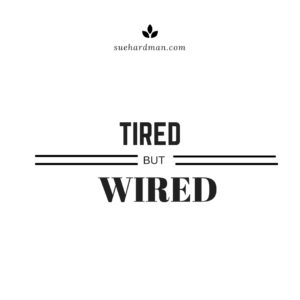Run Down, Burnt Out or ‘Adrenal Fatigue’? Here are the Essential Solutions to Having More Energy
 Get The Essential Solutions – ADD these 3 + avoid these 3
Get The Essential Solutions – ADD these 3 + avoid these 3
One of the most common issues plaguing so many of of us these days is a combination of – feeling tired all day, afternoon slumps or feeling “burnt out,” “run down” or “worn out.”
Take for example, the story of Emma. Emma is a 40 year old full-time working mom with two kids. She works a full day and had no help at home, she pretty much does everything herself!
On the weekends, between her kids’ extra-curricular sports and activities, she rarely has time to relax. When she goes on holiday, they’re more like sightseeing missions than an actual time to rest.
Initially, Emma felt like she could handle her busy, stressful life as she felt motivated and energised. But as time went by, the feeling of being able to handle things started to diminish.
Getting to sleep at night became more difficult as she often felt ‘tired but wired’. She began waking up early in the morning, around 3-4am, and found herself unable to fall back asleep. Mornings became challenging as she often woke feeling unrested, even when she did sleep 8 or 9 hours.
She started to experience blood sugar crashes. She found that she needed to eat more frequently and often craved salt and sweets. She also noticed she was starting to gain weight around her abdomen even though she hadn’t done anything to change her diet. Exercise, which once helped her feel good, now made her feel exhausted.
As things started to deteriorate, life was no longer easy to manage. Work now easily overwhelmed her and she has little energy for her family or friends.
Can you relate?
This is a common experience. What Emma has going on is Adrenal Fatigue or HPA axis dysfunction.
We know that stress causes many diseases, however doctors often dismiss the idea that adrenal fatigue and stress could have any possible links to physical fatigue and illness.
To figure out why you got here, and how you can feel better, you need to understand just how chronic stress creates adrenal imbalances, otherwise known as adrenal fatigue.
How stress creates an imbalance in your adrenal function
Your adrenal glands have many responsibilities, including responding to stress and the situations that cause it. They give us the energy and strength for “fight or flight” in crisis situations by pumping adrenaline and cortisol throughout the body to mobilise resources for this effort. It’s helped keep us alive for millennia.
There are two big problems in our modern world:
#1:Your body can’t detect the difference between life-threatening danger (tiger chasing you) versus when you feel mentally or emotionally stressed (running late), your body reacts exactly the same way – releasing cortisol.
#2:Today’s stress is continuous — perhaps relentless.
Fight-or-flight situations are supposed to be short, giving your body the chance to recover from the negative effects of cortisol and adrenaline. The constant stress means your adrenal glands have to work overtime to keep up.
When scientists measure stress, they find that stress is a function of both demands and control: the greater the demands on you and the lower your control over the outcomes, the higher your stress.
A challenging job, constantly juggling, worrying, taking care of children or elderly parents, skimpy sleep, eating poorly, over-or under-exercising, living in a troubled relationship — are all common examples of high-demand, low-control situations that many women are experiencing.
What is the downward spiral from being worn out, then burnout and finally adrenal fatigue?
Stage 1: Wired and tired
This starts of when you feel wired most of the time, due to an extended release of adrenaline and cortisol in  response to a high stress load. You may even think you’re handling everything just fine because it feels as if you’re getting so much done.
response to a high stress load. You may even think you’re handling everything just fine because it feels as if you’re getting so much done.
Further down the line, as your normal daily cortisol cycle continues to be disrupted by trying to manage more and more stress, you can become both wired and tired.
Stage 2: Stressed and tired
This is the phase you say you feel so wiped out that you can’t get out of bed in the morning, but when it’s time to go to sleep at night, you’re wide awake for hours.
Stage 3: Burnout
The final stage of chronic adrenal stress is exhaustion, when you feel tired all the time, with no energy at all. At this point, cortisol levels decline drastically as the natural rhythms between the brain and the adrenal glands become so disrupted that the adrenal glands stop functioning normally.
At this point, women feel truly exhausted and find it difficult to carry out even simple daily activities.
Make a change now — stress is at the root of many chronic diseases
Stress can be a killer because it is a driving factor in most major chronic diseases. It raises the rates of everything from unhealthy weight gain and hypothyroidism to early aging, heart disease and cancer.
Stress-driven cortisol levels cause all sorts of issues over time, including:
- suppressing the immune system
- raising blood sugar
- ruining sleep-wake cycles
- wrecking digestion
Once cortisol becomes imbalanced, many other hormones and systems go off the rails too, and that’s why stress lurks at the root of most health issues, both minor and major.
Because stress hormones are designed to alter almost every cell and system in your body, when stress is frequent, prolonged or chronic, it can negatively affect your health over time.
The most common health issues arising from chronic stress result and elevated cortisol are its effects on blood sugar, insulin/insulin resistance, blood pressure, immune function, gut health, sex hormones, sleep, mood, memory, cell growth and repair, digestion and thyroid function.
Recognise Any of These Signs of Possible Adrenal Fatigue?
- A feeling you’re constantly racing from one task to the next?
- Feeling wired yet tired?
- A second wind that keeps you up late?
- Difficulty falling asleep or disrupted sleep?
- A feeling of anxiety or nervousness—can’t stop worrying about things beyond your control?
- A quickness to feel anger or rage?
- Memory lapses or feeling distracted, especially under duress?
- Sugar cravings (you need “a little something” after each meal, usually of the chocolate variety)?
- Dreaded abdominal fat, or muffin top—not bloating?
- Skin conditions such as eczema or thin skin?
- Bone loss?
- High blood pressure or rapid heartbeat?
- High blood sugar?
More than 3-5 symptoms indicate that you are likely to have a problem with dysregulated adrenal function.
If these are feelings that you can identify with.
A basic DIY test
It isn’t a 100% scientifically accurate. It’s free and simple and if your results are positive then it may mean you want to get a more in-depth saliva test to check out your cortisol rhythm in the day.
NB: Your results will not mean you have a diagnosis of adrenal fatigue. It can help give you an idea of whether investing money in further private lab testing is worthwhile.
Your practitioner can point you in a direction to get you adrenal test.
How to do the test
To complete the test you will need some sort of torch (use your phone light) and a mirror.
Go to a dark room or just cover your eyes for a while, make sure your eyes have adjusted to the darkness that takes a minute or two.
Stand in front of the mirror and try to find the pupil in your eyes and shine the torch from the side of your face (at a right angle to your eye NOT in front of your eyes as this will damage them!)
Watch your pupil, as soon as you shine light on your pupil it should contract and get really small and stay small. If there are adrenal issues going, your pupil might shrink and then expand again or might shrink and pulse slightly.
Adrenal fatigue is indicated by your pupil doing anything other than contracting and staying contract i.e. if there’s pulsing or any dilation of the pupil while light is shining
Most GPs don’t have these tests available, as they will only check for serious adrenal issues like Addison’s disease.
3 x 3 Steps to Recovery From Run-Down Adrenals
In my experience there are some key things that you should have in place if you want to heal.
Things to Avoid 3 x
- Avoid Caffeine – it raises your cortisol and reduces insulin sensitivity. Caffeine effects the body by forcing your adrenals to pump out cortisol, it also messes with your cortisol rhythm and affects your sleep cycle. If you must have caffeine, stick to one cup in the morning before 10:30am.
- Avoid Sugar and sweeteners – cause blood sugar spikes which can be more exaggerated if you have adrenal dysfunction. Because of the relationship between cortisol and blood sugar, you can get into a vicious cycle of worsening blood glucose and adrenal dysregulation if you don’t manage your blood sugar well by eating foods that stabilise it, like clean protein, good fat, and fibre. Anything that can impact your blood sugar levels can also affect your cortisol levels.While fruit is not necessarily bad in itself, you do need to beware of the quantity that you eat. Try to stick to 1-2 servings of fruit a day. Emphasise fruit that contains less sugar like berries, apples, pears and peaches. Grapes and tropical fruits are all very high in sugar.
- Avoid Food intolerances – particularly gluten, dairy, soy they can trigger the stress response in your body. You can try an elimination diet.
This is a short list so bear in mind there are other considerations. Alcohol? Mould? Being stuck in a job or marriage you don’t love?
Foods to Eat x 3
- Eat a nutrient-dense diet – protein at the right dose for you. For most women, that’s 20-30 grams/meal or 75-100 grams/day.Get rid of foods that you are sensitive to and foods that cause inflammation, eating lots of brightly coloured vegetables, and whole grain gluten-free carbs.
- Replace important nutrients – B vitamins (B5 and B6 in particular) are food for the adrenals, B12 and folate also help with energy production. Vitamin D, selenium, magnesium and zinc are all important for proper thyroid function and adrenal function.
- Eat healthy fats every day – like cold-water fish i.e salmon, sardines or trout.Last but probably the most important you need to reduce the stress in your life.
Also:-
- Saying no to more things
- Give yourself permission to not exercise if you’re tired
- Do deep breathing
- Find some green space to spend time in
Other things you could try for Adrenal Fatigue:
 These are more personal and depend on your health history medication and preference. Use Adaptogenic herbs like liquorice or Ashwagandha.
These are more personal and depend on your health history medication and preference. Use Adaptogenic herbs like liquorice or Ashwagandha.
Final Word
Stress and the effect it has on your adrenal issues, is the root of many hormone imbalance. There are many ways to support your adrenal health — from targeted supplements to key lifestyle changes.
If you suspect that you have adrenal issues, consider working with professional.
As you head in a healthier direction, you’ll feel stronger and more resilient, and your life will change for the better.
Whether you’re wanting to have more energy so that you can keep going all-day long, defy-ageing, have clear glowing skin, to eat better + cleaner you can try any of these free guides to help you on journey to managing these changes, so that you can be a healthier version of yourself.
DISCOVER THE SECRETS TO NOURISH + REJUVENATE your BODY + your LIFESTYLE + your SOUL + yourPURPOSE
The Essential Guide To Having Long-Lasting, All-Day Energy & Vitality
Shout Yes if you want to….
Look vibrant, feel younger & feel more confident
Get you’re energy levels back up & soaring…
Stop your moods swings
Have clearer thoughts & be mentally alert
Have a strong immune system
